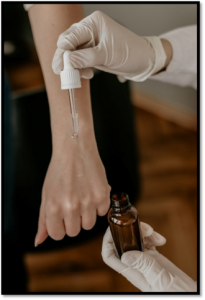While you can try to protect your body from the cold winter breeze by staying  indoors and dressing warm, there’s only so much you can do.
indoors and dressing warm, there’s only so much you can do.
Dryness, itchiness, and irritation are just some of the problems people face once the cold sets in.
UV damage, flaky skin, acne flare-ups, and redness are all clear indications of deeper skin issues like eczema, psoriasis and dermatitis—and they’re especially bad during winter. If not promptly treated, some of them can even lead to long-term problems.
This is why it’s important to deal with the root of the problem—dry skin—early on!
· Use Warm Water, Not Hot Water
In other words, water that’s just a bit above your average body temperature—98.6°F! Water that’s too hot will strip your skin of its natural oils and can make your skin drier. And if you don’t moisturize it straightaway, this causes microscopic cracks to appear on your skin.
· Moisture and Hydration
Keep your skin and the air around you moisturized. Use oils that match your skin’s sensitivity and drink water at regular intervals. And keep a humidifier handy in case you live in a region that’s extra-dry.
· Switch to Gentler Products
Given that the cold air can make your skin extra-sensitive, it might not be a good idea to subject it to any harsh products like skin scrubs or reactive ingredients.
Use products that contain aloe vera and yogurt to keep your pores moisturized. Opt for products that are fragrance-free and gentle.
 · Choose a Better Moisturizer that’s Made for Winter
· Choose a Better Moisturizer that’s Made for Winter
Most winter moisturizers don’t have the thick, cream-based consistency that the need to.
If you can’t find a product that’s good enough, it’s best to use oils like coconut oil. If needed, mix them with rosehip oil, tea tree oil or argan oil and use it for your face so your pores stay hydrated and moisturized.
· Practice Better Care
Don’t go out in the cold with damp hands or right after a shower. Even if you put on a layer of moisturizer, this dampness often causes the moisture to dry away when you go out in the cold air. And that can lead to chapping.
· Consult a Dermatologist if You Need a Specific  Skincare Regimen
Skincare Regimen
If you’re worried about acne or eczema flare-ups during the winter, take the time to consult with a dermatologist on what your skin needs to stay protected.
Medicated skincare products do a world of good for your skin’s health. Acne treatments and chemical peels also prevent further damage.
Conclusion
Winter can be enjoyable, but not if you have skin problems to deal with.
Use the above tips to ensure that your skin stays protected, and book an appointment at Southern Dermatology in Lawrenceville, GA, if you have any questions. We’d be happy to help!